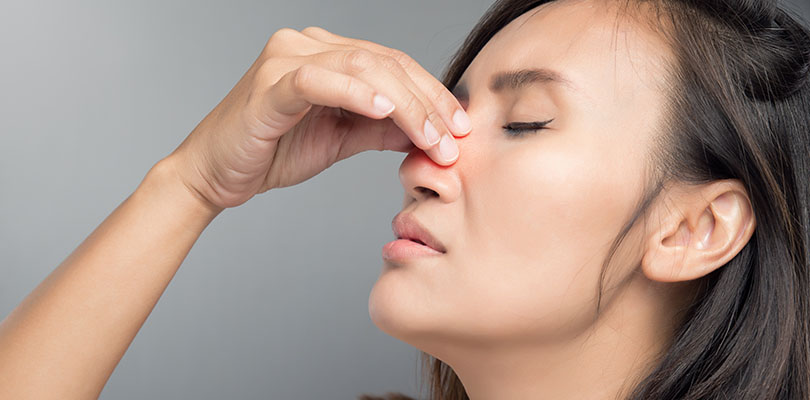What are Nasal Polyps?
According to Mayo Clinic, “Nasal polyps are soft, painless, noncancerous growths on the lining of your nasal passages or sinuses. They hang down like teardrops or grapes." They can range in size from small to large, and the size of them often influences the various symptoms that people experience.
What Causes Nasal Polyps?
Scientists and doctors still haven’t been able to figure out what the root cause of nasal polyps is. They haven’t been able to figure out why inflammation and irritation of the sinuses trigger the growth of nasal polyps in some and not others.
While it still isn’t completely certain that this is the direct cause, some evidence suggests that the reason for the disparity in the development of nasal polyps may be linked to differences in immune system responses. Those that develop nasal polyps have different immune system responses as well as different chemical markers in their mucous membranes.
Polyps can occur at any age. However, it’s more common in young and middle-aged adults.
Symptoms of Nasal Polyps
Nasal polyps tend to occur along with irritation and swelling/inflammation of the sinuses. They can occur anywhere in the sinuses. However, there are some specific symptoms of nasal polyps occurring in conjunction with chronic sinusitis.
According to Mayo Clinic, these symptoms include:
- A runny nose
- Persistent stuffiness
- Postnasal drip
- Decreased or absent sense of smell
- Loss of sense of taste
- Facial pain or headache
- Pain in your upper teeth
- A sense of pressure over your forehead and face
- Snoring
- Frequent nosebleeds
Sometimes multiple polyps or large polyps can impact breathing. There are also other illnesses/risk factors that are associated with nasal polyps. Any illness or condition that irritates or inflames nasal passages (i.e., chronic inflammation) can increase the risk of developing nasal polyps. Conditions such as asthma, cystic fibrosis, Churg-Strauss syndrome, and vitamin D deficiency have all been found to increase the risk of developing nasal polyps. Genetics can also play a role.
Like we discussed earlier with the potential of polyps to impact breathing, there are other potential complications related to nasal polyps. Obstructive sleep apnea can occur if a polyp is severely impacting your breathing. It has also been linked to increasing asthmatic activity as well as making you more likely to have reoccurring sinus infections.
Treatment for Nasal Polyps
After about ten days of symptoms, you should reach out to your doctor. However, if you have trouble breathing, it’s important to receive medical attention immediately.
Medications
Often, your doctors will start with medication to treat nasal polyps. Medications such as nasal or oral corticosteroids may be considered. The purpose of these steroids is to reduce swelling and irritation in nasal passages. There is also a chance that these medications may shrink or even eliminate the polyps.
They may start with nasal corticosteroids and may move on to oral or even injectable corticosteroids if that doesn’t work. Since oral corticosteroids can have severe side effects, you’re usually only prescribed them for a short period of time. Injectable corticosteroids are only used in more severe circumstances.
Injections of a medicine used to treat nasal polyps and chronic sinusitis called, Dupixent, may also be used to treat the condition. This helps reduce the size of nasal polyps, and it also helps reduce congestion.
Your doctor may also consider drugs used to target long-term swelling in sinuses like antihistamines for irritations due to allergies, and/or antibiotics to fight any bacterial infections that are chronic.
Surgery
For those with severe nasal polyps, surgery may be considered. Surgery is only considered if drug treatment hasn’t worked.
The surgery is usually endoscopic, so it isn’t highly invasive. They’re able to remove the polyps that may be blocking your sinuses. Sometimes they may use the tool to expand the openings in your sinuses as well. Afterward, you may be prescribed a nasal spray to help prevent them from returning.
Decreasing the Likelihood of Developing Nasal Polyps
There are also some lifestyle changes you can make to help decrease the likelihood of developing nasal polyps.
Taking care of any allergies or asthma can help reduce the likelihood of developing nasal polyps. Untreated allergies or asthma can increase the likelihood of developing or redeveloping nasal polyps. Avoiding things such as pollen and dust can help as well.
Washing your hands and not rubbing your nose constantly can help reduce the chance of getting any viral or bacterial related illnesses that can increase your chances of developing nasal polyps.
Rinsing your sinuses with saline can also help clean and clear up your nasal passages.
Best Way to Fight Nasal Polyps
Nasal polyps may not occur in everyone. However, there are ways to decrease the chance of developing them.
When in doubt, visit your doctor. They’ll be able to identify whether or not nasal polyps is the problem, or if it’s something else. From there, they’ll be able to provide you with a treatment plan catered to your needs.
